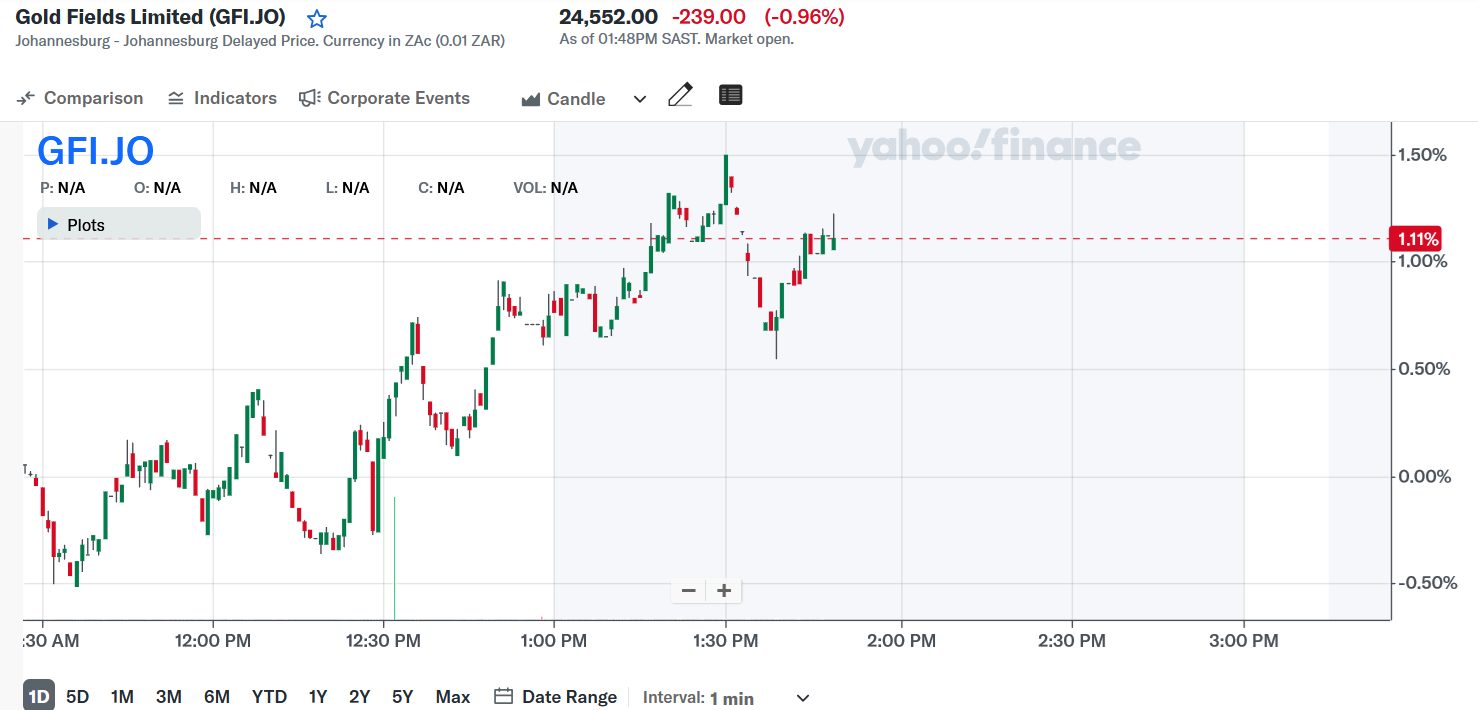Day Trading in Botswana



Botswana’s financial markets are smaller and less closely regulated than those of more developed regions. But strong economic growth — annual GDP is rising 4% over a long-term horizon – and rising interest in online trading means capital markets activity is on the rise.
Using this guide, you can get started day trading in Botswana. We talk about the different types of assets that active traders can deal in, run through the country’s regulatory landscape, and explain how traders are taxed.
You’ll also see how a day trade on the Johannesburg Stock Exchange (JSE) – a popular trading venue for Botswanan investors – could go down.
Quick Introduction
- Day traders in Botswana have a range of instruments to trade including shares, commodities and cryptocurrency, however the Botswana Stock Exchange (BSE) experiences limited trading volumes making it less suited to short-term trading.
- The Southern African country’s capital markets are regulated by the Non-Bank Financial Institutions Regulatory Authority (NBFIRA). The regulator is classified as an ‘orange tier’ regulator under DayTrading.com’s Regulation & Trust Rating.
- Active traders’ profits may be subject to income tax up to 25%, and investors may need to pay withholding tax on rare occasions, payable to the Botswana Unified Revenue Service.
Top 4 Brokers in Botswana
Following our exhaustive tests, these 4 platforms are the obvious choices for day traders in Botswana:
What Is Day Trading?
Day trading generally involves placing a large volume of trades throughout the course of the day to profit from small movements in asset prices.
Participants deal in a wide range of financial instruments including stocks, commodities, and higher-risk instruments like cryptocurrency and derivatives. Forex trading in Botswana is also growing in popularity, providing access to the largest financial market globally.
These investors usually do business during regular market hours. Thanks to better liquidity, they can keep costs to a minimum, as well as enter and exit positions more swiftly and easily.
Price volatility is also more likely around these times, and especially around the release of key economic data. This, in turn, can provide traders with improved short-term trading opportunities.
Traders in Botswana can buy and sell shares on the Botswana Stock Exchange (BSE), located in the country’s capital of Gaborone. Trading usually takes place Monday to Friday between the hours of 10:25 Central Africa Time (CAT) and 13:20, including a 10-minute break at 11:55.
The BSE is home to around 30 companies, including First National Bank of Botswana, financial services group Investec and mining colossus Anglo American.However, low trading volumes mean that short-term traders tend to do business on other regional stock exchanges (such as the Johannesburg Stock Exchange (JSE)).
Is Day Trading Legal In Botswana?
Yes, day trading activities fall under the country’s general financial regulations.
Botswana’s markets are regulated by the Non-Bank Financial Institutions Regulatory Authority (NBFIRA), which was established in 2006 “to safeguard the stability, fairness and efficiency of the non-bank financial sector.”
NBFIRA oversees a wide variety of financial sectors and companies, including:
- Capital markets
- Insurance
- Pension
- Capital markets
- Non-bank lenders
- Asset managers
- Investment advisors
In 2022, NBFIRA passed the Virtual Assets Act to regulate the country’s growing cryptocurrency sector and ensure that investors are properly protected. It requires that companies involved in virtual asset activities (like digital currency exchanges and wallet providers) obtain a license to trade.
How Is Day Trading Taxed In Botswana?
Active day traders may need to pay income tax on any profits they make to the Botswana Unified Revenue Service (BURS).
The country’s tax year runs from 1 July to 30 June, and individuals must send their tax return to BURS by 30 September the following year.
Income tax on Botswanan resident traders is applied at the following progressive rates:
- 0% on income between 0 Botswanan Pula (BWP) and 48,000 BWP
- 5% on income between 48,001 BWP and 84,000 BWP
- 12.5% on income between 84,001 BWP and 120,000 BWP
- 18.75% on income between 120,001 BWP and 156,000 BWP
- 25% on income above 156,001 BWP
Investors are also liable to pay withholding tax on any dividends and interest they receive. Dividends are subject to a flat rate of 10% for both residents and non-residents. Interest, meanwhile, is charged at 10% for residents, and 15% for non-residents.
Getting Started
To start day trading in Botswana you’ll need to complete three simple steps:
- Pick a broker. The most important thing to check is that the company is licensed to do business. This can be done by checking NBFIRA’s website, and/or that of a top-ranked regulator overseas (like the FSCA in nearby South Africa). It’s also critical to consider trading costs, how user-friendly and sophisticated the charting platform is, and the amount of funds you can borrow (known as leverage) if you prefer a riskier strategy. Note that day traders in Botswana typically recruit an international broker to do business with. This is because the platforms, pricing, and regulation of overseas services tend to be superior, especially if you’re interested in CFD trading in Botswana.
- Open an account. You’ll need to provide some personal information so you can open a trading account. You’ll need to provide basics like name, address, and date of birth, though you can also expect questions on your trading objectives and experience. At this stage. you’ll also need to submit proof of identification and address, for example, using Botswana’s Omang.
- Deposit some Botswanan Pula. The final step is to inject some cash into your account so you can start dealing securities. You’ll most likely do this by wire transfer or debit card, although some brokers may allow you to use an online payment provider, such as popular mobile solution in Botswana, Orange Money.
A Day Trade In Action
At this point, you’ll be ready to begin buying and selling securities. But what might a day trade look like? Here’s an example of a potential trade on the neighbouring JSE.
The Background
My strategy involves trading shares in Gold Fields Limited, one of the world’s largest precious metals producers. More specifically, I plan to buy shares before the US Bureau of Labor Statistics releases its next set of consumer price inflation (CPI) data.
My view is that inflation will have risen by 2.5% year on year in the last month (at the time of writing), lower than the 2.7% increase that the broader market is pricing in. Such a result could prompt the Federal Reserve to cut interest rates sooner, or more aggressively than previously thought.
Why could this be important for gold and gold-mining shares? The US dollar is likely to weaken if the central bank cuts rates, making it more cost-effective to buy buck-denominated gold and thus boosting demand.
Before placing my trade, however, I carry out some technical analysis on Gold Fields’ share price to get a better steer on where it might head.
Successfully identifying price and volume trends, patterns and indicators on the charts is an important part of making short-term trading strategies (like day trading) a success.

The Trade
The BLS is due to release those inflation numbers at 08:30 local time. This translates to 14:30 in both Botswana and Johannesburg (which runs on South African Standard Time, or SAST).
I therefore sit down at 14:20 my time and prepare to key in my trade. To help me manage risk I do this in two parts:
- I place a ‘stop loss’ order, which limits any losses I may incur if Gold Fields shares unexpectedly fall.
- I punch in a ‘take profit’ order, a tool that locks in any earnings I generate before prices have an opportunity to reverse.
These instructions work by automatically closing my position if the miner’s share price rises or falls to my pre-specified levels, whatever happens first.
With Gold Fields shares trading at 24,346 South African cents per share, I place my ‘take profit’ order at 24,394 and my ‘stop loss’ instruction at 24,321. Then I sit back.
Within a few minutes, I see that my prediction was right. CPI in the US rose by a lower-than-predicted 2.5% last month, causing gold prices to rise and with it Gold Fields’ share price.
After another three-quarters of an hour my ‘take profit’ order is triggered and I’ve booked a profit of 48 cents for each share I bought.
Bottom Line
As with many African markets, the concept of day trading in Botswana is a relatively new one. However, thanks to strong economic growth and improving financial awareness, interest in this high-risk trading strategy is on the rise.
Investors should remember that capital market regulation is less stringent in Botswana than in many other countries. Ensuring that the brokerage you select is approved by a respected regulator is essential.
To get moving, leap into DayTrading.com’s selection of the best day trading platforms.
Recommended Reading
Article Sources
- IMF Staff Completes Article IV Mission to Botswana – International Monetary Fund (IMF)
- Botswana Stock Exchange (BSE)
- Market Hours - BSE
- Johannesburg Stock Exchange (JSE)
- Non-Bank Financial Institutions Regulatory Authority (NBFIRA)
- Capital Markets – NBFIRA
- Individual - Taxes on Personal Income in Botswana - PwC
- Botswana Budget Highlights - KPMG
The writing and editorial team at DayTrading.com use credible sources to support their work. These include government agencies, white papers, research institutes, and engagement with industry professionals. Content is written free from bias and is fact-checked where appropriate. Learn more about why you can trust DayTrading.com



